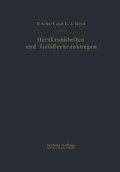Zusammenfassung
Manche Ärzte sind noch im Zweifel, ob man zwischen diesen beiden Zuständen eine scharfe Trennungslinie ziehen könne. Wir ziehen ihre Erörterung als gesonderte Krankheitsbilder trotz vielen und starken, gegen eine solche Einteilung sprechenden Argumenten vor.
Access this chapter
Tax calculation will be finalised at checkout
Purchases are for personal use only
Preview
Unable to display preview. Download preview PDF.
Schrifttum
Dunn, W. H. “Emotional factors in neurocirculatory asthenia.” Psychosomat. Med., 4, 333, 1942.
Friedman, M. “Etiology and pathogenesis of neurocirculatory athenia.” War. Med., 6, 221, 1944.
Friedman, M.“Studies concerning the etiology and pathogenesis of neurocirculatory asthenia.” Am. Heart J., 30, 557, 1945.
Grant, R. T. “Observations on the After-histories of Men Suffering from the Effort Syndrome.” Heart, 12, 121, 1925.
Hill, I. G. W., and Dewar, H. A. “Effort Syndrome.” Lancet, I, 161, 1945. Jones, M., and Lewis, A. “Effort syndrome.” Lancet, 1, 813, 1941.
Lewis, T. “The Soldier’s Heart and the Effort Syndrome.” 2nd Edition, London, Shaw and Sons, 1940.
Oppenheimer, B. S. “Neurocirculatory Asthenia and Related Problems in Military Medicine.” Bull. New York Acad. Med., 18, 367, 1942.
Parkinson, J. “Effort Syndrome in Soldiers.” Brit. M. J., I, 545, 1941. Walker, W. J. “The patient with functial cardio-vascular disorders.” Am Heart J., 42, 97, 1951.
Wittkower, E., Roder, T. F., and Wilson, A. T. M. “Effort Syndrome.” Lancet, I, 531, 1941.
Wood, P. “Da Costa’s Syndrome (or Effort Syndrome). ”Brit. M. J., I, 767, 805 and 845, 1941.
Author information
Authors and Affiliations
Rights and permissions
Copyright information
© 1955 Springer-Verlag
About this chapter
Cite this chapter
Scherf, D., Boyd, L.J. (1955). Herz- und Kreislaufneurosen und neurozirkulatorische Asthenie. In: Klinik und Therapie der Herzkrankheiten und der Gefäßerkrankungen. Springer, Vienna. https://doi.org/10.1007/978-3-7091-7854-6_26
Download citation
DOI: https://doi.org/10.1007/978-3-7091-7854-6_26
Publisher Name: Springer, Vienna
Print ISBN: 978-3-7091-7855-3
Online ISBN: 978-3-7091-7854-6
eBook Packages: Springer Book Archive

